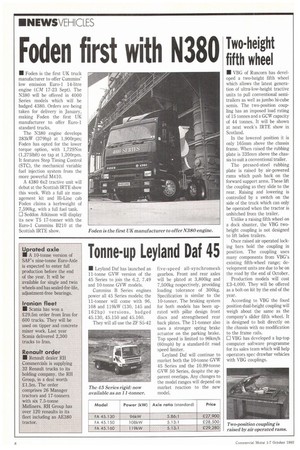Two-height fifth wheel
Page 10

If you've noticed an error in this article please click here to report it so we can fix it.
• VBG of Runcorn has developed a two-height fifth wheel which allows the latest generation of ultra-low-height tractive units to pull conventional semitrailers as well as jumbo hi-cube semis. The two-position coupling has an imposed load rating of 15 tonnes and a GCW capacity of 44 tonnes. It will be shown at next week's IRTE show in Scotland.
In the lowered position it is only 165rnm above the chassis frame. When raised the rubbing plate is 335mm above the chassis to suit a conventional trailer.
The pressed-steel rubbing plate is raised by air-powered rams which push back on the forward support arms. These lift the coupling as they slide to the rear. Raising and lowering is controlled by a switch on the side of the truck which can only be operated when the tractor is unhitched from the trailer.
Unlike a raising fifth wheel on a dock shunter, the VBG twoheight coupling is not designed to lift laden trailers.
Once raised air operated locking bars hold the coupling in position_ The coupling uses many components from VBG's existing fifth-wheel range; development units are due to be on the road by the end of October.
Production models will cost £3-4,000. They will be offered as a bolt-on kit by the end of the year.
According to VBG the fixed position dual-height coupling will weigh about the same as the company's slider fifth wheel. It is designed to bolt directly on the chassis with no modification to the frame rails.
0 VBG has developed a lap-top computer software programme for its sales team which will help operators spec drawbar vehicles with VBG couplings.
















































































